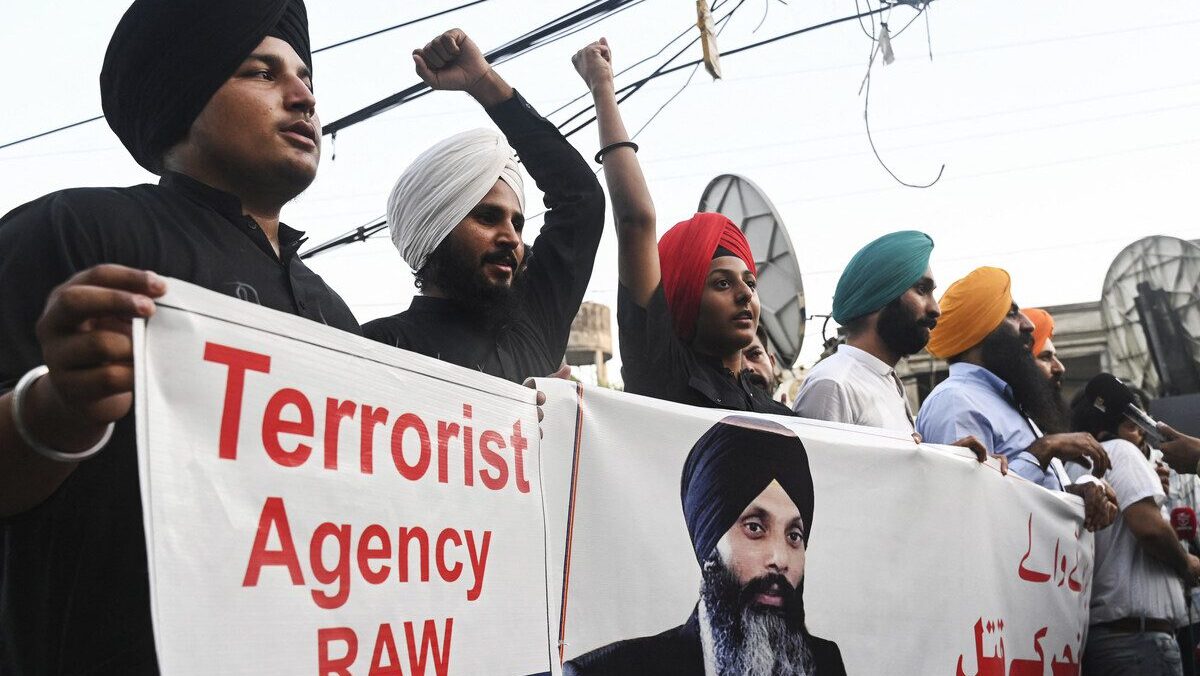
Members of Pakistan’s Sikh community take part in a protest in Lahore on September 20th, 2023, following the killing in Canada of Sikh leader Hardeep Singh Nijjar.
Photo: Arif ALI / AFP
A continued diplomatic spat over the murder of a Sikh Leader and Canadian national, which Canada accuses India of having had a hand in, has prompted New Delhi to suspend visa services for Canadians.
The sanction comes on the heels of a September 20th press release, in which India’s Foreign Ministry urged its citizens and students in Canada to “exercise utmost caution” in light of “growing anti-India activities and politically-condoned hate crimes and criminal violence” there.
Just hours after India’s travel advisory, Canada’s public safety minister Dominic LeBlanc told reporters that Canada is a safe country.
The warning is believed to be primarily aimed at Indian students in the country, of which there are some 320,000, by far the largest group (40%) of overseas students in Canada.
The normally friendly relations between the two countries started to cool after Canadian PM Justin Trudeau accused India during last Monday’s Parliament session of possibly having played a role in the murder of Sikh leader Hardeep Singh Nijjar, a Canadian citizen.
On June 18th, two masked men, still unidentified and unaccounted for, shot Nijar, 45, dead while he was sitting in his truck in a car park outside a Sikh temple in Vancouver.
The Sikh diaspora in Canada is the largest outside the Indian state of Punjab. Nijjar’s murder sparked demonstrations in several Canadian cities.
Nijjar had been a vocal advocate for the creation of Khalistan, an independent ethno-religious state for Sikhs—who make up about 2% of the proposed state’s population—within India. New Delhi therefore branded him a separatist and terrorist.
In the wake of Trudeau’s j’accuse, a top Indian diplomat was promptly expelled. In response, New Delhi, who called the accusations “absurd,” expelled a top Canadian diplomat in turn.
According to India, Trudeau made similar allegations during India’s G20 summit, which Prime Minister Modi dismissed at the time.
Commenting on Nijar’s murder last Monday, Trudeau said his government was “actively pursuing credible allegations” that Indian agents had potentially been involved in the murder, and had been discussing the matter with key allies such as the Five Eyes intelligence sharing alliance, which counts the U.S., the UK, Australia and New Zealand among its members.
Later on Thursday, September 21st, CBC News reported, citing government sources, that the Canadian government had “amassed both human and signals intelligence in a months-long investigation of Nijjar’s death. That intelligence, these sources say, includes communications involving Indian officials themselves (among them, Indian diplomats working in Canada).
The same day, the Canadian PM called on India to cooperate with the investigation into the murder but said Canada would not release its evidence.
The situation puts Canada’s western allies, primarily the U.S. and the UK, between a rock and a hard place diplomatically. Since they view India as a crucial counterweight to China’s global influence, they have shown themselves hesitant in announcing their full-throated support for Canada’s position.
Talking to Reuters, professor of international relations at Ottawa’s Carleton University Stephanie Carvin said that “India is important in Western calculations for balancing China, and Canada is not,” which “really does put Canada offside among all other Western countries.”
